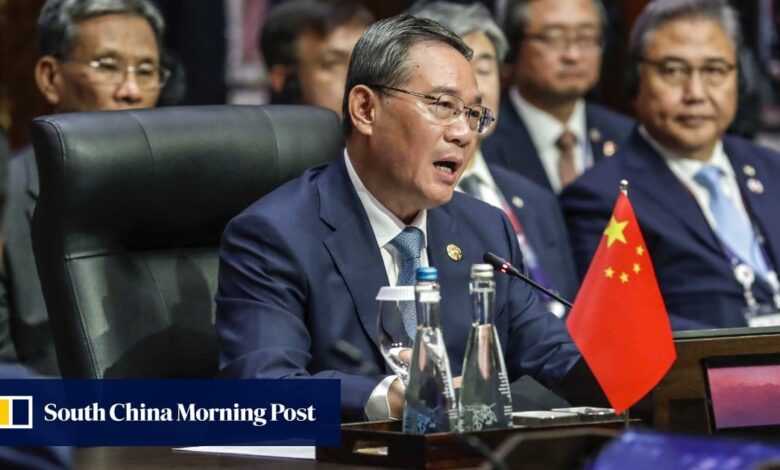China’s Li Qiang urges Asean, Japan and South Korea to oppose ‘new cold war’ amid growing US rivalry

[ad_1]
“It’s very important at present to oppose taking sides, bloc confrontations and a new cold war,” he said.
Some politicians and pundits have characterised the escalating competition between Washington and Beijing as another cold war, but debates have emerged among scholars about whether this is an accurate framing for the bilateral relationship.
Many countries, including those in Asia, have found themselves caught in the middle during the intensifying rivalry between the two powers.
Li said China and Japan, South Korea and Asean countries shared a common home.
“If there is peace and prosperity, we all benefit, while if there are upheavals and chaos, we all suffer,” he said.
Li, China’s No. 2 official, said the country was on track to achieve its annual economic growth target of around 5 per cent for 2023, noting that would create more opportunities for other economies in the region and the world.
Beijing’s ties with Tokyo and Seoul are at a low ebb as China grows increasingly frustrated with its neighbours’ tilt towards the US.
Will belt and road, Asean trade be China’s silver lining amid US de-risking?
Will belt and road, Asean trade be China’s silver lining amid US de-risking?
In a separate meeting between China and Asean on Wednesday, Li said Beijing and the 10-member bloc had built “firmer” political mutual trust over the past decade, deepened their cooperation in security and taken “more practical” actions to maintain regional stability.
“As long as we continue to adhere to the right path, no matter what storms we go through in the future, the cooperation between China and Asean will be unbreakable, stable and far-reaching,” he said.
He said China was moving faster than expected to meet its goal of importing US$150 billion worth of agricultural products from Asean countries in the five-year period ending in 2026, with more than US$55 billion bought so far.
China’s exports to Asean – its largest trading partner – declined 2 per cent from a year ago in the first seven months of the year in dollar terms while imports dropped by 6.3 per cent, according to Chinese customs data.
[ad_2]
Source link






